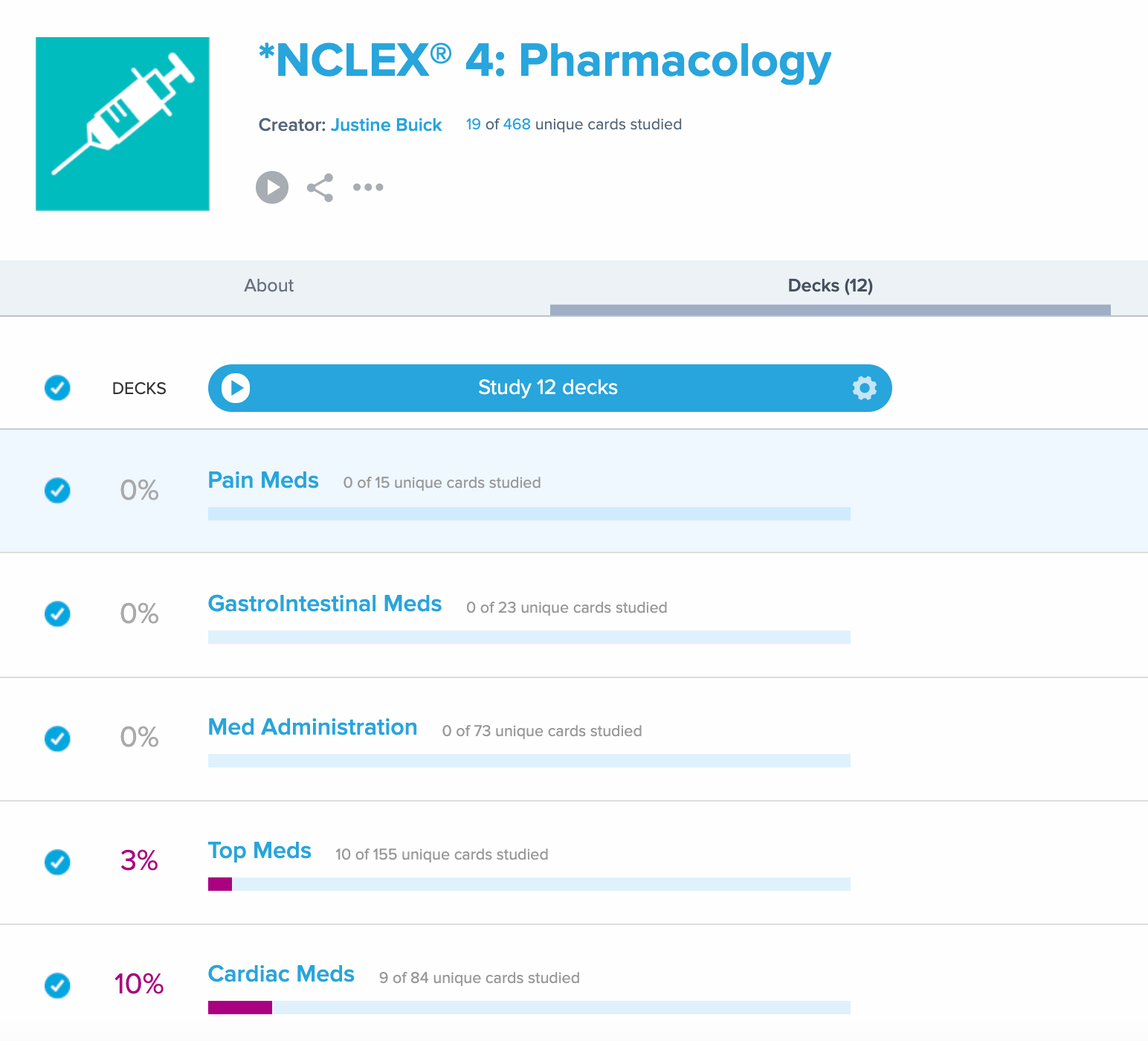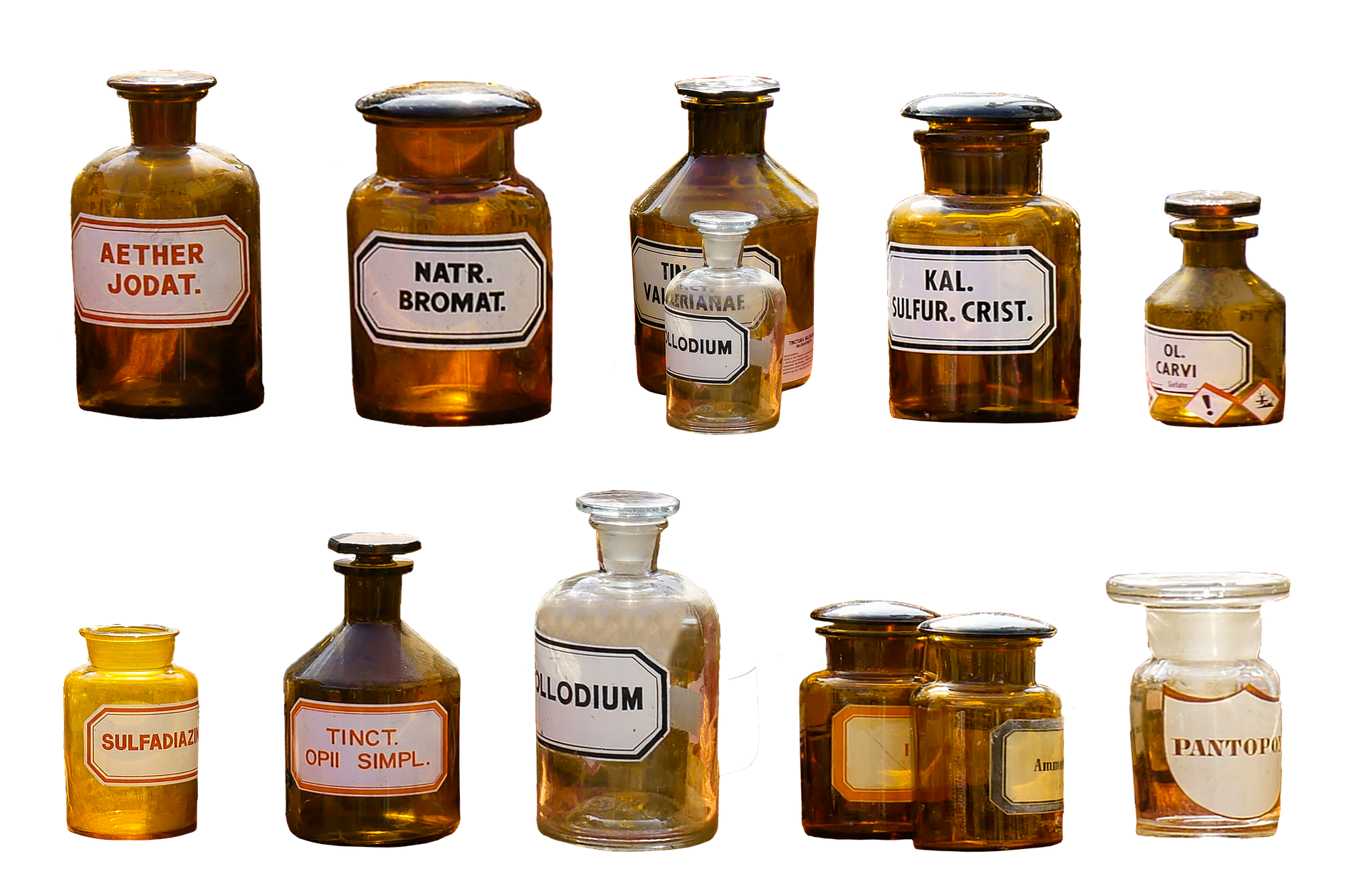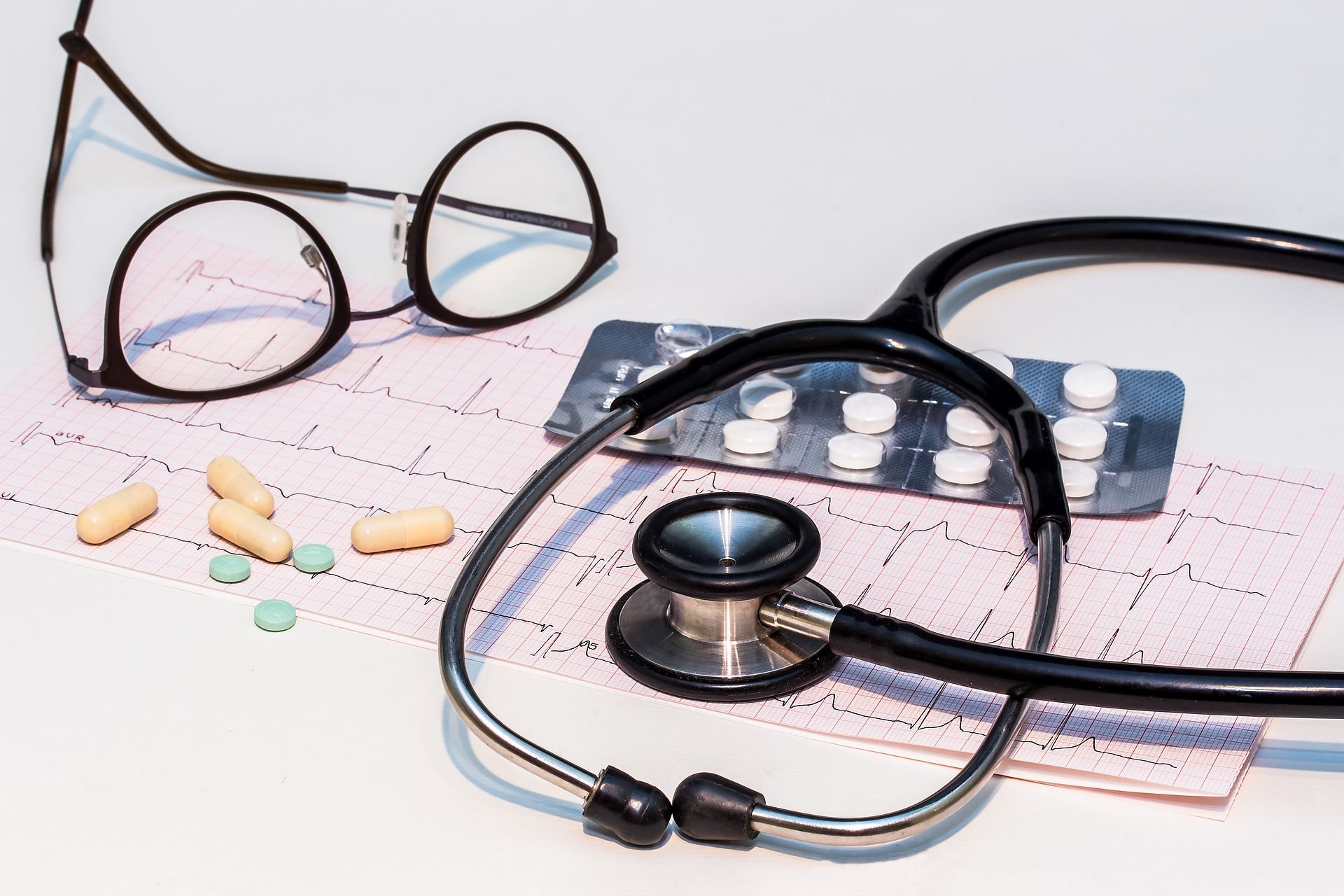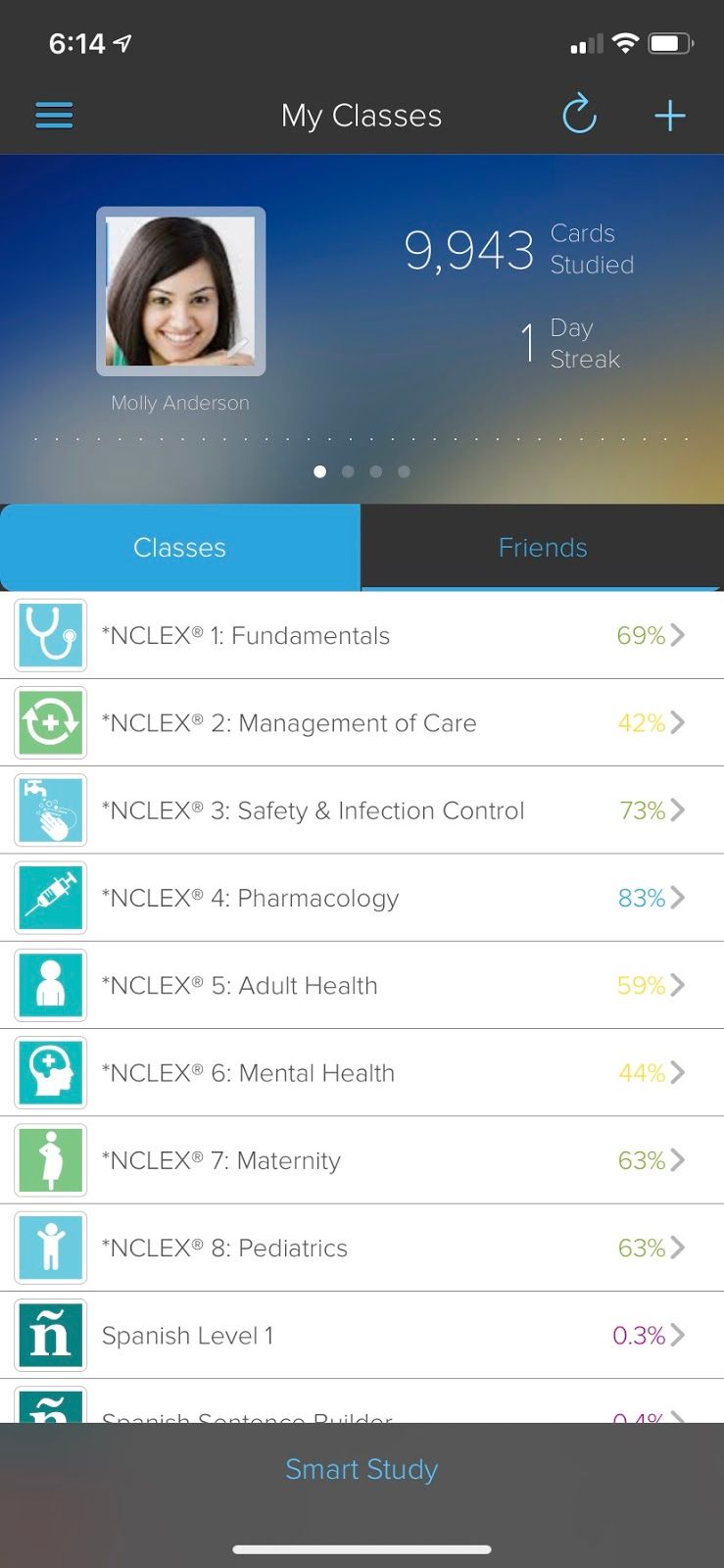Medications to Review for Nclex Suffixes All Nurses

One-time around 400 BC, Hippocrates, the founder of modern medicine, divined the oath that would get an integral part of the physicians' creed for over 2500 years. One part of it states: "I will neither requite a deadly drug to anybody who asked for it, nor will I make a suggestion to this event."

Medications have the ability to heal and to harm. Studying them is a vital part of practicing prophylactic nursing, and of passing the NCLEX. However, for most students, learning all the medications for the NCLEX is also the hardest, driest, and most overwhelming part of preparing for the exam.
Information technology's easy to see why. There's a seemingly countless listing of meds, side effects, technical terms, and nursing considerations for Every. Unmarried. 1. of our modernistic medications. The inside scoop on all this is that there are certain medication facts you lot need to memorize, and other facts you tin featherbed. And so … it'southward fourth dimension to give you the nitty- gritty on what you exercise and don't need to study in order to master medications for the NCLEX.
Justine Buick, www.TheNCLEXTutor.com, has helped thousands of students navigate the maze of studying meds for the NCLEX. She'south partnered with Brainscape to create some smashing resources, and what follows are her top strategies for learning NCLEX medications in an efficient and time-bourgeois way.
What to learn for each NCLEX medication
If you tried to acquire every single thing virtually each medication you studied, you'd even so exist studying for the NCLEX five years later. Fortunately, you don't demand to practice this to set properly for the NCLEX.
Here's a listing of what you need to encompass for each med:
- Medication classifications
- Medication prefixes and suffixes
- Generic names
- The indication
- How the medication works (and which bodily arrangement it influences)
- Side furnishings (the most common and the serious, adverse reactions)
- Nursing considerations
If this still seems like a long list, that'due south ok. The truth is that all of these factors relate to each other, so learning 1 will assistance you acquire others.
Nosotros'll go into this in more than detail next. As we go over the connections between each factor, you lot'll encounter how they connect to make your task easier.
(Psssst. On the subject field of making your chore easier, bank check out our list of top apps for nurses and nursing students!)
1) Medication classifications

Here'south a listing of the classifications you'll need to learn:
- Amphetamines
- Anti Allergy drugs
- Anti Alzheimer's
- Antibiotics
- Anticonvulsants
- Antidepressants
- Antidiarrheals
- Antiemetics
- Antigout
- Antilipidemics
- Antineoplastics
- Antiosteoporotic
- Antiparkinsonians
- Antipsychotics
- Antispasmodics
- Anxiolytics
- Bronchodilators
- Corticosteroids
- Diuretics
- Erectile dysfunction drugs
- H2 receptor blockers
- Insulins
- Laxatives
- Musculus relaxers
- NSAIDs
- Opioids
- Proton pump inhibitors
- Stool softeners
- Thrombolytics
Again, this may seem like a long list! (Welcome to the NCLEX). The good news is that if y'all larn these over several weeks or months, information technology's quite manageable. Afterwards all, if you lot have to build a house, you lot do it 1 nail and board at a time. And the best way we know of to intermission all this learning into bite-sized chunks is by making use of the twelve Brainscape NCLEX Pharmacology flashcards (Available for both the RN & PN versions of the NCLEX).

Using this resource spaces out your learning into the nigh optimal intervals, and makes sure you review merely the right corporeality to go along your new memories fresh. It's the most efficient manner to study for the NCLEX in general.
So, one long list of diuretics and antidiarrheals down … time to move on.
two) Prefixes and suffixes
As a nurse, it'south important to know your LOLs (beta-blockers) from your NITRO (antianginal). Learning the prefixes and suffixes for each classification of medication helps in two ways:
Firstly, it reduces what yous demand to learn: just memorize the suffix or the suffix, and non the whole medication name.
For instance, beta-blockers all end in -lol. So when you're learning a list of beta-blockers like:
- Atenolol
- Carvedilol
- Metoprolol
- Nebivolol
You'll just need to learn "-lol means "beta-blockers."
Secondly, learning the prefixes and suffixes gives yous another hook to hang your cognition on.
For example, if a patient comes to you lot with unpleasant side effects from nebivolol, you will know immediately from the suffix that nebivolol is a beta-blocker. So, even if y'all've forgotten the exact particulars of the drug, your general cognition of beta blockers will assist yous understand why the patient may be having side effects.
3) Generic names

For every drug, in that location'due south a generic name, which refers to its chemical make-upward. Then there'southward the specific brand proper noun developed and trademarked by a pharmaceutical visitor.
For example, the generic proper name for a potent opioid analgesic is Fentanyl. Some of the make names for this drug are: Sublimaze, Actiq, Duragesic, Fentora, Abstral, Lazanda, and (many) others.
You'll demand to learn only the generic names — and non all these brand names — for the NCLEX.
4) The indication
The indication is what the drug is used for. For instance, ACE inhibitors are used for decreasing blood pressure and heart charge per unit to forestall myocardial infarction.
Agreement what the different medications are used for (and how to safely use them) is a baseline requirement of your nursing education. Nurses must safely administer medications, respond patient questions, and identify side effects and agin reactions. This requires nurses to accept a thorough working noesis of the most common medications prescribed.
5) How it works
How medication works is called the mechanism of action. In essence, it'southward how the medication works in the torso at the cellular level. Knowing this provides a useful scaffold for connecting the drug to the indication and the side effects.
For example, you lot know that ACE inhibitors treat hypertension – that'due south the indication.
The mode they do this, (the mechanism of action) is by preventing the conversion of angiotensin I to angiotensin II. Angiotensin Two is a strong vasoconstrictor. In other words, ACE inhibitors assist to enlarge blood vessels, which, therefore, decreases blood pressure.
In that location are many ways to work on calculation knowledge to your retention inventory. Flashcards are an first-class way. Some other complementary way is to have a skilful understanding of how the facts you're learning fit together. When you connect cause and issue in a strong framework, you lot're adding extra 'hooks' your encephalon can utilise to retrieve information during your test.

Therefore, knowing the mechanism of activity for medication is important, both to give you a good knowledge base for using meds, and to help you memorize all the most mutual uses and side effects.
6) Side effects and agin reactions
Medication is a double-edged sword. Information technology tin can salvage lives, but if it's applied inappropriately, it can cause damage or fifty-fifty death. Information technology's estimated that 125,000 Americans die each year from prescription medications. This is why it'due south so important for nurses to know the almost common side effects and agin reactions for the medications the patient may be taking.
Have you always read the back of a pill bottle? Drug companies these days listing every possible side upshot that can arise (and several that have been noted in only a unmarried patient). Fortunately, you don't need to memorize this whole list for the NCLEX. There's a much more strategic approach to take that will serve you well.
Side effects fall into 2 categories, and it's a practiced idea to larn these for each med y'all study.
Category 1: common side effects
You lot don't have to learn every unmarried side effect possible: just the most common ones and these are covered in Brainscape's NCLEX RN flashcards (Also, available for the NCLEX PN). Y'all may besides find them by using a nursing drug guide.
Category 2: KILLER side effects (adverse reactions)
In rare cases, medications can take severe adverse reactions such as anaphylaxis or an extensive rash. These serious adverse reactions are highly probable to feature in the NCLEX test because a pinnacle priority of this test is to assess whether pupil nurses can be rubber and effective when caring for patients.
If 1 misses a killer side effect, the patient could dice. Brand it a priority to memorize these. Once again, they're all covered in the Brainscape NCLEX flashcards (or PN flashcards).
7) Nursing considerations

Nursing considerations are the interventions you need to practice when giving medication. This includes things like labs to check before giving a med, assessments to brand, educational activity the patient nigh med administration, and any contraindications.
For example: orthostatic hypotension tin can be a side effect of calcium aqueduct blockers. Therefore, a nursing consideration when administering them would exist to check the patient'due south blood pressure to make sure information technology'due south not too low (< 100/lx) before administration.
Another example: beta-blockers can cause bronchoconstriction, so administering them to a customer with asthma could cause an increase in difficulty breathing.
Answering NCLEX practice questions is a bang-up mode to exam your ability to combine your knowledge of side furnishings and nursing considerations to make good decisions and ace the NCLEX.
[Hey! Do yous know the difference between the NCLEX RN and PN exams? Make certain you do and so that you're prepared!]
How to learn NCLEX meds
Now that we've covered what to acquire when you're studying NCLEX medications, information technology's time to look at how you can best and most efficiently larn these facts.

The nearly efficient way nosotros've worked out for students is by using the Brainscape flashcards developed in partnership with Justine Buick of world wide web.theNCLEXtutor.com.
These flashcards encompass all the near important facts you'll need to know in guild to pass the NCLEX, organized in a style that makes studying hyper-efficient and painless. (Yep, we do empathise how painful information technology tin can be to force-memorize hundreds of medications.) The good news is, once all these facts are in your long term memory, y'all'll be able to draw on this noesis for the residuum of your nursing career, even in high stakes environments.
Brainscape NCLEX-RN flashcards cover all 8 sections of the exam. The Pharmacology section is further broken downwardly into 12 menu decks, consisting of almost 500 cards in total. Or if y'all're preparing for the NCLEX PN, we've got yous covered for that exam likewise.
What sets Brainscape's adaptive flashcard learning platform autonomously from newspaper cards?
Information technology leverages key principles in cerebral science to help you larn and think the information.
As you answer each carte du jour (which makes use of the highly constructive active call up method of learning) y'all charge per unit how well you knew the answer. Brainscape's algorithm then uses spaced repetition to time how often you need to revisit cards to commit the information to your long term memory.
This is how students using Brainscape flashcards can learn up to twice every bit fast : the content is delivered to them at optimal intervals, and they revisit one-time material just enough to proceed it fresh in their memory.
Also, the Brainscape app allows you to sync your flashcards beyond multiple devices. Instead of having to boost NCLEX review books across boondocks (costless weight preparation, anybody?), you can use your smartphone or tablet to speedily revise in those in-between times: while waiting for a bus, or for your partner to finally choose which Netflix show to watch tonight. (Our Planet? Star Trek? The Godfather?)
You can likewise apply Brainscape to make your own flashcards. This is particularly useful for those facts that y'all just won't stick. This is where you can use unusual imagery (you lot tin make flashcards with pictures) or even tape audio for give-and-take associations to make the cognition stick.
Summary: how to study NCLEX meds
In summary, NCLEX medications are a body of cognition many students discover overwhelming. Even so, learning what y'all need to is not quite as difficult equally it showtime appears.

For common medications, yous'll need to know:
- Classification
- Prefixes and suffixes
- Generic names
- Indications (what the medication is for)
- How the medication works
- Side effects and adverse reactions
- Nursing considerations
Using Brainscape NCLEX-RN flashcards or Brainscape NCLEX-PN flashcards, you can do this with just a petty report each day. The Brainscape algorithm will keep your learning at the optimal pace and so you tin efficiently commit this body of knowledge to retentivity. This is how passing the NCLEX becomes a straightforward task, so you tin movement on to helping many people in a successful nursing career.
**NCLEX-RN® is a registered trademark of the National Council of State Boards of Nursing (NCSBN), which neither sponsors nor endorses this production.
Source: https://www.brainscape.com/academy/how-to-study-nclex-medications/
0 Response to "Medications to Review for Nclex Suffixes All Nurses"
Post a Comment